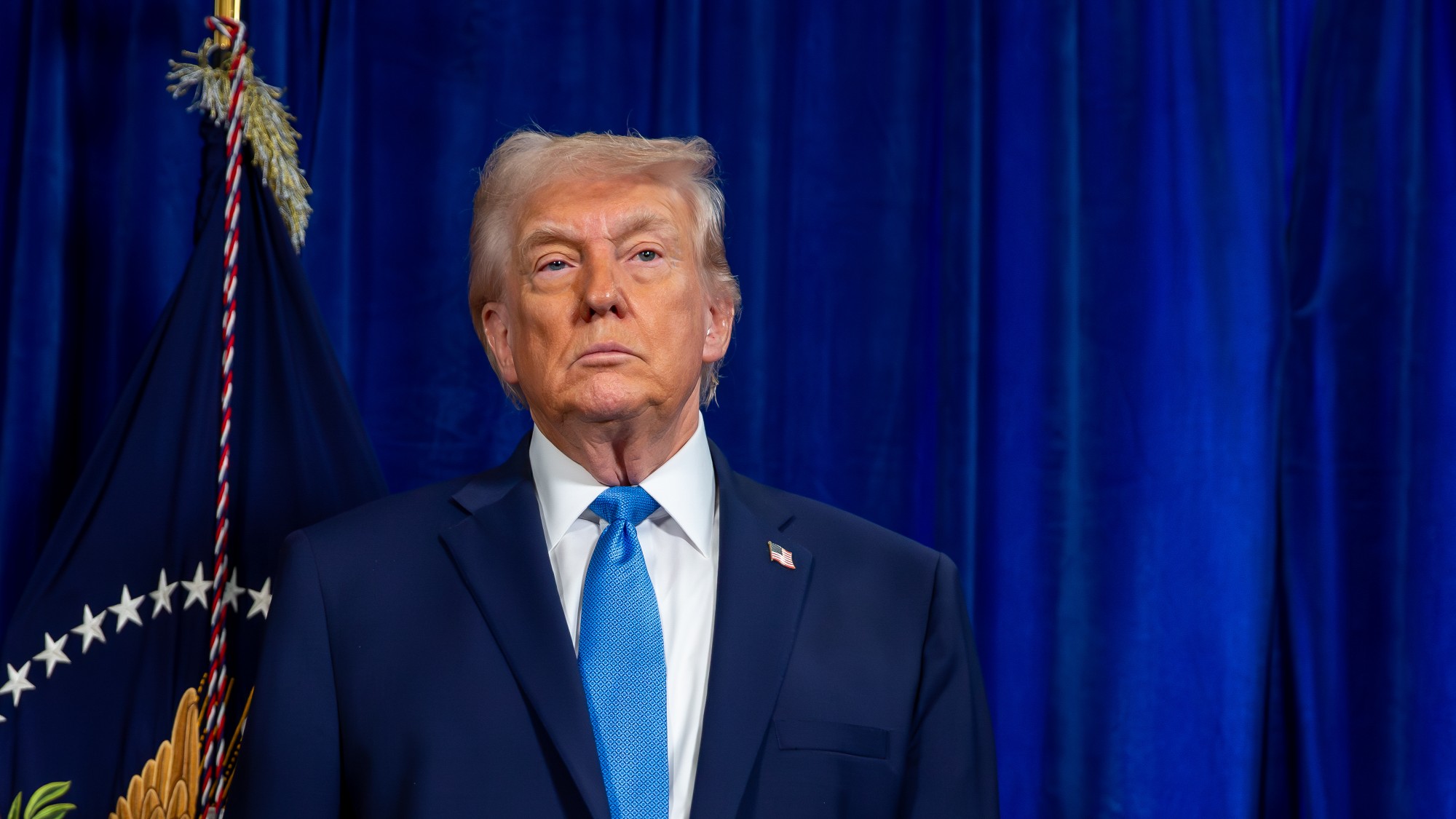Trump is destroying the idol of the presidency. That's a good thing.
It's okay to hate the president


A free daily email with the biggest news stories of the day – and the best features from TheWeek.com
You are now subscribed
Your newsletter sign-up was successful
And it came to pass, as soon as he came nigh unto the camp, that he saw the calf, and the dancing: and Moses' anger waxed hot, and he cast the tables out of his hands, and brake them beneath the mount. [Exodus 32:19]
President Trump is not doing a good job.
Every campaign promise that he has not explicitly abandoned he has shown himself too clumsy to deliver on regardless of his willingness. We bombed Syria. The auto industry is still in decline. ObamaCare is not going to be repealed any time soon. When you let yourself be outfoxed by Rand Paul, who has compared health care to "slavery," you have no business talking about your deal-making prowess.
And yet, in at least one sense, Trump's presidency has moved the country in a very positive direction: He is helping America smash the idol of the presidency.
The Week
Escape your echo chamber. Get the facts behind the news, plus analysis from multiple perspectives.

Sign up for The Week's Free Newsletters
From our morning news briefing to a weekly Good News Newsletter, get the best of The Week delivered directly to your inbox.
From our morning news briefing to a weekly Good News Newsletter, get the best of The Week delivered directly to your inbox.
This is the best thing about Trump's presidency. He has woken millions of American — left, right, and tedious center — from their collective childlike slumber, in which sugar-plum fairies dance about the feet of Lincoln and tickle the cavernous noses of Mt. Rushmore before flitting off to tend the gardens of Monticello.
Donald Trump has helped us remember that it's okay to hate the president.
Even under George W. Bush and Barack Obama, for all the partisan hatred their tenures at 1600 Pennsylvania Ave. occasioned, the idol of the presidency was still widely given homage. "He's the president of this free country, young man!" is what my shrewish computer-science teacher said when I wore my homemade "Who the hell is George W. Bush?" T-shirt to school on my first day of high school. And Democrats caromed off one another in the rush to compose the most flatulent paeans to the high and noble office of the commander-in-chief after Rep. Joe Wilson (R-S.C.) lobbed an ill-considered insult at Obama during an address to Congress in 2009.
Millions of Americans hated Bush. Millions of others hated Obama. But they were often shamed for it. To hate the president was widely seen as just plain wrong.
A free daily email with the biggest news stories of the day – and the best features from TheWeek.com
Why do we invest so much emotional energy in the presidency? Why do we find this office worthy of unconditional reverence? Why do we insist on giving the president his due even if we think he is a liar or a cretin or a tyrant or even just boring? Why — most important — do we pretend that our opponents are being gauche when they insist on not sticking strictly to the letter of the hazily defined rubrics of public piety we were ourselves happy to ignore only a few years ago?
I am not, either by principle or temperament, much taken with the idea of elections and representative government. Asking ordinary people to care about the vain words and idle promises of politicians strikes me as coercive and cruel. Let them focus on God and their lives and families instead. It would be a far, far better world if we had a kindly senescent king or queen from a long line, whose main hobbies were stamp collecting or lepidoptery, presiding over a generous welfare state, cities full of mustachioed cyclists delivering milk, and a countryside dotted with beautiful churches and environmentally friendly ironworks.
But these are idle dreams.
Given that we have democratic self-government, it would seem to be obvious that the best thing about it is that we don't have to like or care about or even pay attention to — much less esteem — our head of state. This has been the most admirable thing about the Trump presidency — until yesterday.
President Trump was in Poland giving a speech about foreign policy. By his standards, it was on point and not wholly lacking in interest. But it was still just pretty standard Trump fare.
But to read the responses from conservative commentators, you would think that it was an occasion of Periclean grandeur. "Wow," said National Review's Rich Lowry, who found it "moving" and "beautiful," full of "robust language." (This is a guy whose magazine devoted an entire issue to why this man should never be president.) The Weekly Standard's Bill Kristol, who backed an unknown former House staffer and spook whose hapless campaign is still buried in debt rather than endorse the Republican nominee, called Trump's speech "eloquent." Ben Domenech, editor of The Federalist, suggested that Trump's speech "could've been given by [former Sen. Rick] Santorum," which, for all five of us who admire the Pennsylvania conservative and look back fondly on his anti-contraception, pro-manufacturing presidential platform, is high praise indeed.
I understand that opinions change when the facts do, but gushing like this in the face of so much alarm over Trump's every nod and gesture strikes me as the desperate attempt of people who know better trying to polish a golden calf.
Not feeling compelled to like the president is the best thing about America. Let's not forget it.
Matthew Walther is a national correspondent at The Week. His work has also appeared in First Things, The Spectator of London, The Catholic Herald, National Review, and other publications. He is currently writing a biography of the Rev. Montague Summers. He is also a Robert Novak Journalism Fellow.
-
 Touring the vineyards of southern Bolivia
Touring the vineyards of southern BoliviaThe Week Recommends Strongly reminiscent of Andalusia, these vineyards cut deep into the country’s southwest
-
 American empire: a history of US imperial expansion
American empire: a history of US imperial expansionDonald Trump’s 21st century take on the Monroe Doctrine harks back to an earlier era of US interference in Latin America
-
 Elon Musk’s starry mega-merger
Elon Musk’s starry mega-mergerTalking Point SpaceX founder is promising investors a rocket trip to the future – and a sprawling conglomerate to boot
-
 The billionaires’ wealth tax: a catastrophe for California?
The billionaires’ wealth tax: a catastrophe for California?Talking Point Peter Thiel and Larry Page preparing to change state residency
-
 Bari Weiss’ ‘60 Minutes’ scandal is about more than one report
Bari Weiss’ ‘60 Minutes’ scandal is about more than one reportIN THE SPOTLIGHT By blocking an approved segment on a controversial prison holding US deportees in El Salvador, the editor-in-chief of CBS News has become the main story
-
 Has Zohran Mamdani shown the Democrats how to win again?
Has Zohran Mamdani shown the Democrats how to win again?Today’s Big Question New York City mayoral election touted as victory for left-wing populists but moderate centrist wins elsewhere present more complex path for Democratic Party
-
 Millions turn out for anti-Trump ‘No Kings’ rallies
Millions turn out for anti-Trump ‘No Kings’ ralliesSpeed Read An estimated 7 million people participated, 2 million more than at the first ‘No Kings’ protest in June
-
 Ghislaine Maxwell: angling for a Trump pardon
Ghislaine Maxwell: angling for a Trump pardonTalking Point Convicted sex trafficker's testimony could shed new light on president's links to Jeffrey Epstein
-
 The last words and final moments of 40 presidents
The last words and final moments of 40 presidentsThe Explainer Some are eloquent quotes worthy of the holders of the highest office in the nation, and others... aren't
-
 The JFK files: the truth at last?
The JFK files: the truth at last?In The Spotlight More than 64,000 previously classified documents relating the 1963 assassination of John F. Kennedy have been released by the Trump administration
-
 'Seriously, not literally': how should the world take Donald Trump?
'Seriously, not literally': how should the world take Donald Trump?Today's big question White House rhetoric and reality look likely to become increasingly blurred
